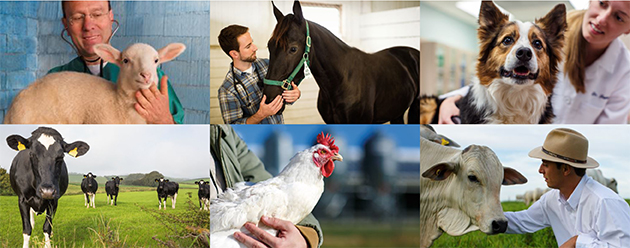
Infectious Diseases Threaten Animal Health
April 13, 2016
New infectious diseases and new subtypes of ever-present diseases are constantly emerging. These diseases can affect animals and people alike. Zoetis is at the forefront of the battle to combat bacteria and viruses threatening animal health.
New infectious diseases and new subtypes of ever-present diseases are constantly emerging. These diseases can affect animals and people alike. Zoetis is at the forefront of the battle to combat bacteria and viruses threatening animal health.
Leptospirosis: A widespread infection
Did you know 75% of healthy horses have been exposed to an infectious bacterial disease that can cause blindness, abortion, and kidney failure?i Researchers say that this disease, leptospirosis, may be even more prevalent than previously known. This is because the clinical signs of the infection such as fever, depression, anorexia, and pain are general symptoms that don’t specifically point to leptospirosis. Zoetis offers a way to evaluate the risk of a horse’s exposure to leptospirosis by answering a few simple questions.
Dogs are victims of leptospirosis too. The symptoms can range from mild to fatal, and some infected dogs are long-term carriers despite appearing healthy. The infection is spread from dog to dog via their urine. Leptospirosis is a zoonotic disease, which means it can spread to humans too.
Zoetis offers vaccines against leptospirosis. VANGUARD® L4 helps prevent leptospirosis in healthy dogs. LEPTO EQ INNOVATOR®, introduced late last year, is the first and only vaccine to help prevent leptospirosis in horses caused by Leptospira Pomona.
Bird flu
Avian influenza is another disease threatening animal health. This virus affects mainly migratory birds, but recent outbreaks have affected chickens and turkeys. Different subtypes of avian flu pose different threats. Some subtypes are symptom-less and some are highly pathogenic, resulting in death within 48 hours. Outbreaks of avian flu are expensive and affect food supplies. Zoetis helps producers detect avian flu in poultry with several diagnostic options and offers a vaccine for this disease.
Dogs get the flu too
Birds aren’t the only animals threatened by influenza. A new subtype of canine influenza virus (CIV) H3N2, has arrived in pets in the U.S. that causes fevers, coughs, dripping noses, runny eyes, lethargy, and no appetite. It is a mutation of avian influenza virus, and previously it had only been seen in dogs in Asia. Because this flu subtype is new and almost no dogs have antibodies to fight it, it has the potential to spread unchecked in an unvaccinated population.
In March 2015, an outbreak of canine influenza, H3N2, occurred in Chicago, Illinois. Zoetis researchers immediately prioritized development of a vaccine. By November 2015, the U.S. Department of Agriculture had granted a conditional license to Zoetis to market the first commercially available H3N2 canine influenza vaccine. “Given the urgency associated with emerging infectious diseases, it is always our goal to respond as quickly as possible with effective solutions,” said Shelley Stanford, DVM, Group Director, Companion Animal Division Veterinary Professional Services. “We are very proud that we had the capability to address the pressing need for a vaccine to help control the spread of CIV H3N2 in just seven months.”
Virus travels Europe
In 2011, a mysterious disease started causing cattle in Germany to suffer fever, diarrhea, and reduced milk yields. Just a few short months later, Germany, Holland, and Belgium saw an uptick in still births and fetal abnormalities in sheep, cattle, and goats. Eventually 16 other European countries experienced similar outbreaks. Both clinical syndromes were found to be the result of the Schmallenberg virus, named after the German town where it was first found. Scientists believe the virus spread so quickly because it is transmitted via bites from infected midges.
“The biggest potential losses come from infection occurring during pregnancy. There is a window of susceptibility: in sheep between days 28 and 56 of pregnancy, and in cattle days 70 to 150, during which infection of the dam can result in malformed offspring. The dam may show no clinical signs, but big losses can occur due to the impact on the developing fetus,” said Carolyn Hogan, Zoetis National Veterinary Manager for Cattle in the UK. “Vaccination remains the most effective way of ensuring valuable livestock are protected.” Zoetis’ Zulvac® SBV is a vaccine in the UK registered to help protect cattle and sheep against Schmallenberg virus.
Protecting against these diseases
Emerging infectious diseases threaten the health of animals and people. Zoonotic diseases are likely to become more prevalent as a result of the increasingly close association between people and animals. Mutations occur in many of these viruses and bacteria, which causes new strains to develop.
Zoetis knows that staying abreast of current strains of infectious disease is key to developing quick solutions. That’s why we have formed alliances with emerging infectious disease networks to bring together the top experts and the best resources to identify and combat these new diseases. To learn more about our approach to rapid response to emerging infectious disease, read this story, and for more information about our research alliances, read this story featuring Scott Brown, Vice President of External Innovation, Veterinary Medicine Research & Development.
i Data on file, Study Report No. Restricted Grant-FTLEPTO13 (v1.0) TI-01366, Zoetis Inc., Divers TJ, Chang Y-F. Leptospirosis. In: Robinson NE, Sprayberry KA, eds. Current Therapy in Equine Medicine. Vol 6. 6th ed. St. Louis, MO: Saunders Elsevier; 2009:145-147, Thomas H. Leptospirosis in horses. Equine Chronicle. January/February 2015. Available at: http://www.equinechronicle.com/leptospirosis-in-horses. Accessed April 8, 2016.